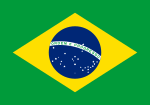Corruption in Brazil exists on all levels of society from the top echelons of political power to the smallest municipalities.[1][2][3] Operation Car Wash showed central government members using the prerogatives of their public office for rent-seeking activities, ranging from political support to siphoning funds from state-owned corporation for personal gain. The Mensalão scandal for example used taxpayer funds to pay monthly allowances to members of congress from other political parties in return for their support and votes in congress. Politicians also used the state-owned and state-run oil company Petrobras to raise hundreds of millions of reais for political campaigns and personal enrichment.[citation needed]
Corruption was cited among many issues that provoked the 2013 protests.[4] Corruption directly affects the welfare of citizens by decreasing public investments in health, education, infrastructure, security, housing, among other rights essential to life, and hurts the Constitution by expanding social exclusion and economic inequality.[5]
Studies by the Getúlio Vargas Foundation (FGV) from 2009 estimate that the Brazilian economy loses from corruption, every year, from one to four percent of the Gross Domestic Product (GDP), the equivalent of one value over 30 billion reais.[6] The following year, a study by the Federação das Indústrias do Estado de São Paulo (Fiesp) found that the annual cost of corruption in the country is 1.38 percent to 2.3 percent of the GDP.[7] In 2013, a study by the Industry National Confederation showed that each real misappropriated by corruption represents a damage to the economy and society of three reais.[8]
The "Brazilian way" is seen as a practice of "small corruptions", such as evading taxes, stealing cable TV signals, jumping the queue, simulating or concealing business, among others.[9][10][11]
- ^ "Desvios com fraude na merenda podem chegar a R$ 2 milhões, diz MP". Ribeirão e Franca (in Brazilian Portuguese). March 30, 2016. Retrieved February 1, 2017.
- ^ "Polícia flagra desvio de merenda escolar no interior de São Paulo". Jornal O Expresso. February 28, 2016. Retrieved February 1, 2017.
- ^ "PSDB vê superfaturamento em compra de kits escolares". www.ovale.com.br. Archived from the original on October 21, 2018. Retrieved February 1, 2017.
- ^ What's REALLY behind the Brazilian riots? Archived July 23, 2017, at the Wayback Machine CNN June 14, 2013
- ^ Luiz Flávio Gomes. "O custo da corrupção no Brasil". JusBrasil. Retrieved June 29, 2017.
- ^ "FGV: corrupção custa R$ 30 bi ao ano para a economia do País". Terra (in Brazilian Portuguese). Retrieved January 6, 2022.
- ^ Marina Pinhoni. "5 efeitos danosos da corrupção que você não vê". Exame. Abril. Archived from the original on May 20, 2018. Retrieved May 19, 2018.
- ^ Pinhoni, Marina. "5 efeitos danosos da corrupção que você não vê". Exame. Abril. Archived from the original on December 25, 2016. Retrieved May 19, 2018.
- ^ "Veja 10 exemplos de corrupção no cotidiano do brasileiro". Terra (in Brazilian Portuguese). Retrieved January 6, 2022.
- ^ Bedinelli, Talita (December 5, 2013). "A corrupção nossa de cada dia". El País Brasil (in Brazilian Portuguese). Retrieved January 6, 2022.
- ^ "O suposto "jeitinho brasileiro"". Legis-Ativo (in Brazilian Portuguese). Retrieved January 6, 2022.
